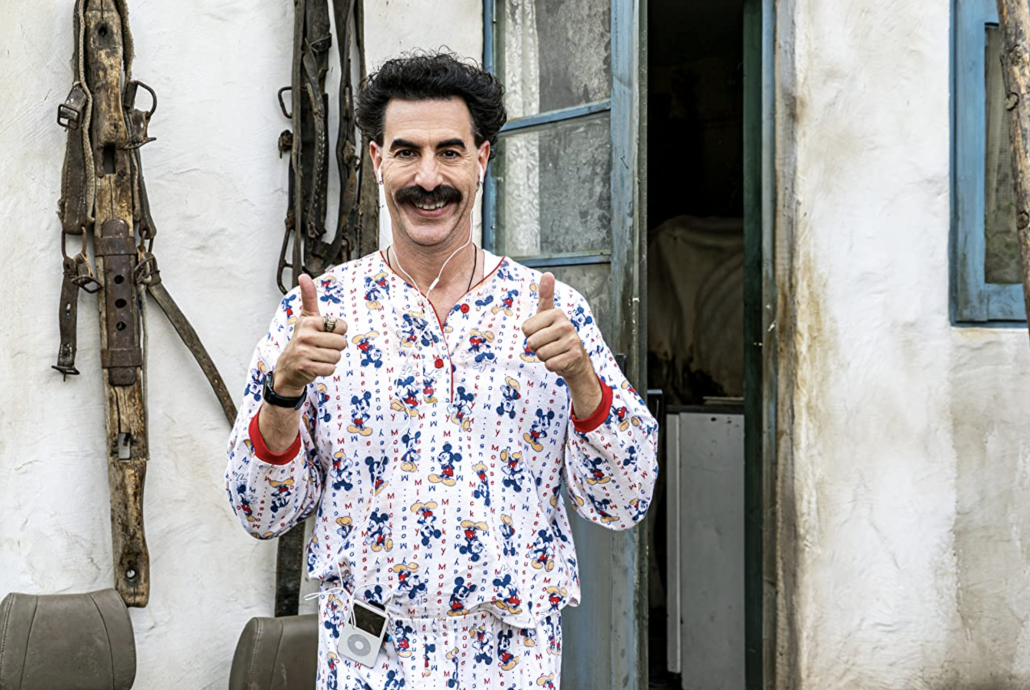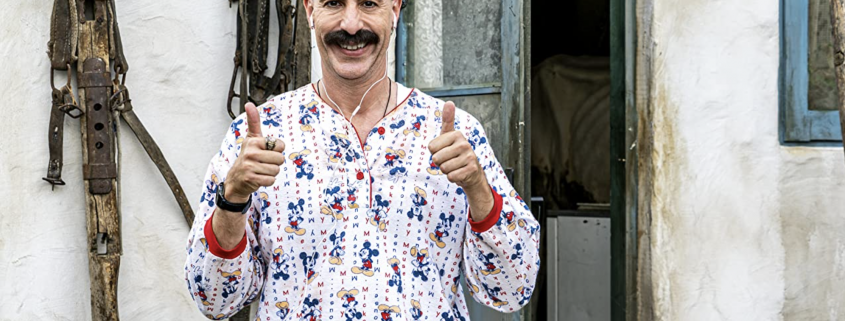‘Borat Subsequent Movie Film:’ A fun yet unnecessary sequel

Jagshemash!
Borat is back! In 2006, Sacha Baron Cohen introduced the world to Borat Sagdiyev, a reporter from Kazakhstan on a mission to document his travels in the “US and A.” During his first visit, he pulled outrageous stunts like wrestling naked with his producer in a hotel room and kidnapping Pamela Anderson. His absurd comedy relied on anonymity; nobody knew who Borat Sagdiyev was. He could get away with certain stunts because no one saw them coming.
Fourteen years later, this has drastically changed. Borat has become a cultural icon, well known across the United States. The joke of Borat being an anonymous troll is ruined. After all, it’s impossible to have a gag relying on anonymity when everyone knows who you are. This was the biggest obstacle the reprisal had to tackle. What to do when everyone is in on the joke? The answer: give Borat a daughter.
“Borat Subsequent Moviefilm” begins by catching us up on what has happened since we last saw Borat. He has been digging trenches in a gulag for the last 14 years as punishment for embarrassing Kazakhstan. Now, he is out and given a mission to return to the United States and deliver a monkey, who serves as Kazakhstan’s Minister of Culture, to Vice President Mike Pence. After he lands in Texas he says rude and racist things to the locals, prompting chuckles and shocked faces, relying on the same tropes he used in the first movie.
But he quickly runs into the issue of people recognizing him. Cohen’s character has become too iconic — when people see him, they know they are getting conned. Although his character tries to employ disguises to mask his identity, it does not have the same effect. Nothing can top the comedic relief provided by Cohen’s first film, in which no one knew who Borat was.
Despite no longer having the advantage of anonymity, Borat did not lose his ability to show how concepts like racism and antisemitism have become mainstream. He goes to a rally against the stay-at-home order during the coronavirus pandemic and sings a song about how “Obama was a traitor … America he hate her” or we should “inject him [Obama] with the Wuhan flu.” His music is met with fervent enthusiasm from his crowd. He then experiences a crisis of faith after being told the Holocaust was fake, and cheers after speaking to a Holocaust survior and learning it was real. His stunts are just as uncomfortable as they were in the first film.
The best part of the Borat sequel quickly becomes apparent: his daughter Tutar (Maria Bakalova). Because of her anonymity, she manages to bring back the shock value the original movie relied on. Her stunts are abstract, from teaching a women’s group how to masturbate to claiming her father put a baby in her after accidentally swallowing a decorative plastic baby on a cupcake. Her plot line is delightfully complicated; she is the 15 year-old devoted daughter of Borat who sneaks her way into the United States by eating a monkey originally intended to be a gift for Pence.
Then in the United States, she learns how to be a feminist, rebels against her father, before finally offering herself to Rudy Giuliani, a former Mayor of New York City. Tutar’s chaotic storyline is fun and unpredictable, mimicking the spontaneity and excitement viewers were introduced to in the first film. She is the best part about this sequel and the movie’s answer to how to cope with the ruined joke. The addition of a daughter was an interesting attempt to make Borat a family man. Surprisingly, it gives a previously flat individual character development and adds a wonderful wholesome element to the film.
The movie ends with a unique take on the spread of the coronavirus, claiming the virus was orchestrated by Kazakhstan and Borat was patient zero. It is a satirical finale that makes light of an awful situation, something the original Borat film did very well.
The film is fun and shocking, yet it does not have the same magic as the original. Is it because the joke is no longer funny? Or, is it because the movie is not necessary?
When the original Borat film was released during the height of the Bush Administration, it was a way of making jokes out of serious social issues, like antisemitism and homophobia, that were not widely discussed at the time. Much has changed since 2006. Issues that were once avoided are now discussed openly in the media.
Former President George W. Bush’s words and actions were more discrete compared to President Donald Trump’s. There is no need to expose Trump for controversial remarks he has made because he is so open with his beliefs. Therefore, Borat making jokes about the current president or vice president are not shocking or surprising. These jokes have been made consistently over the past four years. There is no need to hear them again.
While the jokes about the current administration come off as slightly stale and unoriginal, they do not detract much from the overall quality of the movie. We certainly didn’t need another Borat film, but this is a fun, enjoyable follow-up.
Rating: ⅘

